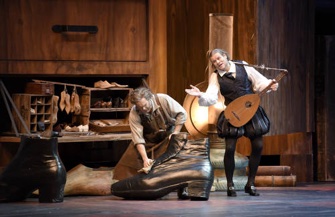
On first encounter, Richard Wagner’s Die Meistersinger von Nürnberg would seem to be an early work. Not only is it a comedy, completely at odds with the supernatural themes that pervade his later operas, but it contains all the elements that Wagner himself railed against in his theoretical writings, with its use of rhymed verse, traditional arias, choruses, a quintet and, in the final act, even that staple of backward-looking French 19th-century opera, a ballet. It would therefore seem surprising that, although originally conceived much earlier, this tale about the 16th-century guild of mastersingers in the Bavarian city of Nuremberg was in fact written immediately after Wagner had composed Tristan und Isolde and before he had completed the Ring Cycle.
On closer inspection, however, Die Meistersinger represents to a large extent Wagner’s mature reflections on the traditions, rules and craft of music-making, and he clearly saw much of himself in the central character, the shoemaker Hans Sachs, who is based on the famous historical mastersinger of the same name – Wagner even signed some of his letters with Sachs’s name rather than his own. The composer claimed that writing Tristan had left him in a state of euphoria and freed him to write a comedy, to the extent that he was even able to include a playful quotation from the über-serious earlier work in Die Meistersinger.
The gloriously inventive new production by Stefan Herheim at the Opéra National de Paris Bastille, which was first staged at the Salzburg Festival, takes as its starting point the connection between composer and cobbler. Before the famous overture even begins, we see Sachs in his home and workshop in the middle of the night, sitting at his desk in a frenzied state of inspiration. Different parts of his home become metaphors for each of the next three acts, with the stage magically becoming an enlarged section of Sachs’s life and imagination. The most stunning transformation occurs at the very beginning when the cobbler’s cluttered desk becomes a Lutheran church as members of the chorus sing a Bach-like chorale. Heike Scheele’s wonderfully imagined set designs are works of art in themselves, and play a large part in the success of the production.
Wagner’s love of Shakespeare and the midsummer setting of the opera give Herheim license to make his staging into a German version of A Midsummer Night’s Dream. When Beckmesser’s clumsy attempts to woo Eva by serenading her in the second act are disturbed by a riot, for example, he is set upon by various figures from fairytales in this version.
And then there is the music. Such music! From the beginning of the overture, conductor Philippe Jordan and his Paris Opera orchestra opt for beauty over bombast, and the result is incandescent. The singing is excellent throughout, too. Gerald Finley’s stage presence and impeccably controlled tone give the central role of Sachs an appropriate dignity and warmth. Tenor Brandon Jovanovich as the stranger Walther von Stolzing, who falls in love at first sight with Eva (radiantly sung by Julia Kleiter) and attempts to win her hand by performing in the singing competition, grows in stature as the opera progresses and performs his prize song with ardor and beauty. Bo Skovhus manages to make the caricatural role of Beckmesser more fully rounded than is often the case. Of the other singers, particular mention should be made of Toby Spence’s engagingly sung David (Sachs’s young apprentice) and the honeyed tone of Günther Groissböck as Eva’s father Pogner.
Even though this production of Die Meistersinger weighs in at nearly six hours (including two intermissions), the quality of the music-making and staging make the evening fly by. Get a ticket now if you can!
Favorite